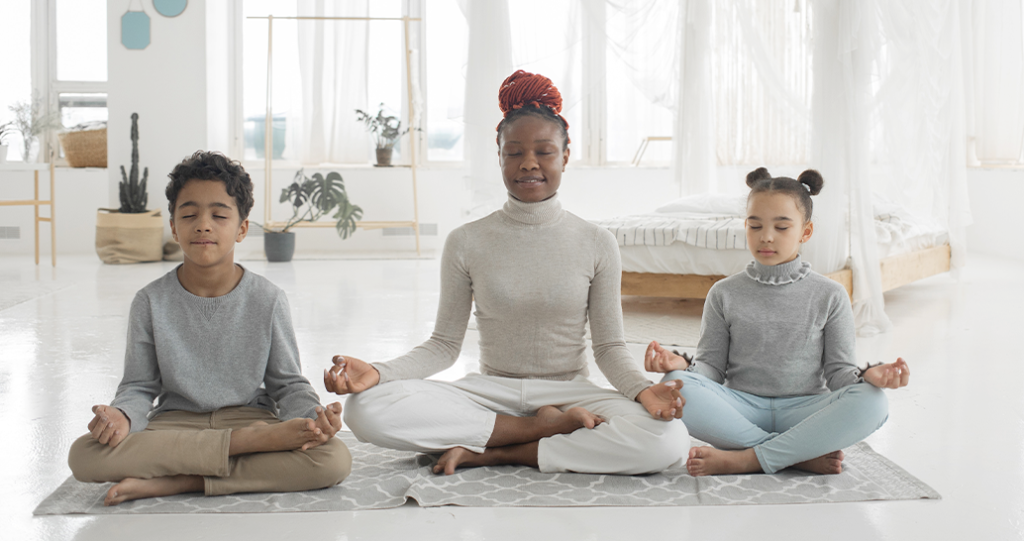Ways to Practice Mindfulness at Home

Winter in Canada can be beautiful and fun-filled; however, it also brings brutally cold weather, short days and long nights. We believe this is a time when it’s imperative to spend a little extra time focused on mindfulness and self-care!
Mindfulness has been shown to have a positive effect on mental health, physical health and cognitive function- it’s a great way to slow down and tune into what you need to stay healthy and feel happy during this season! If you are feeling down, stressed, or anxious, and have trouble sleeping there are some simple techniques you might find helpful.
One of the most important things to remember about mindfulness and self-care is that they look different for everyone, there is no one size fits all option. We have put together a list of ideas and practices that you may find helpful, take what you need and leave what you don’t.
When you begin to practice mindfulness, it can be helpful to set a clear intention. Are you trying to increase your ability to stay present in a given moment? Reduce stress levels? Would you like to be able to clearly identify anxious thoughts? Even if the answer is all of the above, it is important to start small and take one step at a time.
A good starting point can be adding mindfulness to your current daily routine. This might mean slowing down while you complete tasks and taking some extra time to indulge in seemingly mundane tasks. For example, practicing mindful eating. We are all guilty at times of eating on the go, eating while we work or eating out of boredom. Mindful eating entails actively making a decision to pick a food that you will truly enjoy eating, taking the time to prepare said food, unplugging from work or other tasks while you eat and focusing your attention on the food in front of you. A great way to start is to take a few slow deep breaths before, during and after a meal! This kind of mindfulness can be added to many daily tasks including:
- Your morning routine.
Instead of reaching for your phone or computer when you wake up, develop a routine that is just for you. Think of what you would like to accomplish during the day. Set an intention for the day, prioritize nourishing yourself properly, make a to-do list for the day and set yourself up to feel positive and accomplished. Practicing mindfulness in the morning can also entail noticing when you wake up not feeling your best and deciding to alter your day accordingly!
- Your daily commute/drive.
This can be especially important in Canadian winters. The stress of traffic, especially if you are short on time can be heavily exacerbated by winter conditions. This is also when it’s most dangerous to be driving. Practicing mindfulness when you drive is not only good for your mental health but can help keep you safe. While it’s not realistic to never become frustrated while you drive, putting together a driving playlist that includes music you love, guided breathing or meditations or your favourite podcasts can be great ways to lower your stress level.
- Taking breaks.
If you are looking to take your practice one step further, there are plenty of simple activities you can add to your daily schedule. One of the most impactful can be meditation and breathing exercises. Traditionally, meditation is practiced in silence with the goal of noticing and quieting your thoughts. That being said, silent meditation can be difficult and may not work for everyone. This is where guided meditation and breathing exercises can be great options, from apps to Spotify playlists and YouTube channels there are many resources available. Guided practices are a great option because they are usually targeted at solving a specific problem or stressor. You can find guided meditations for better sleep, lower stress, letting go of negative thoughts and patterns, improved confidence and improved concentration! Research has shown that even 5 minutes of breathing and meditation daily can reduce stress levels, increase concentration, improve sleep quality and improve your overall mood.
Journaling is also a great way to practice mindfulness. From grabbing an empty journal and letting your thoughts and emotions flow on paper to following a more structured process of journaling with prompts- writing things down can help bring awareness and structure to your thoughts and feelings.
The practice of mindfulness at its root is meant to help us find more awareness in our everyday lives. To help us observe our emotions, our actions and our feelings without judgment. Learning to be mindful as well as learning to practice self-care (to indulge in things that make us feel good) can help turn a sometimes-challenging time of year into a positive one!
Take some time to reflect on the things you enjoy! While these can be extravagant, they can also be small and simple. If you love the outdoors, try embracing winter. From catching snowflakes to a winter hike in the forest, finding fun yet simple activities to do in the snow is a great way to practice mindfulness. For those who like to hibernate indoors, spraying your favourite scent to preparing your favourite foods, taking a hot bath, getting in bed early and spending time with your loved ones – there are many options.
Commit some time in your daily schedule to taking care of your mental health and prioritize feeling good this winter!
While mindfulness, meditation and self-care can have life-changing benefits, there are some signs that you may benefit from reaching out to a doctor or mental health professional. If you are experiencing prolonged periods of sadness, hopelessness, lack of sleep, chronic fear, intense mood swings, panic attacks, or insomnia and find yourself unable to handle daily stresses and keep up with daily tasks – it can be helpful to seek support from a healthcare professional.

News

CAPREIT announces Release of 2024 ESG Report

The Pendrell 1770 wins the CoStar Impact Award for Sale/Acquisition of the Year

Q&A with CAPREIT’s Julian Schonfeldt on the firm’s portfolio evolution

CAPREIT announces $194 million in new acquisition and disposition activity

CAPREIT Announces $104 Million Disposition in Montréal
